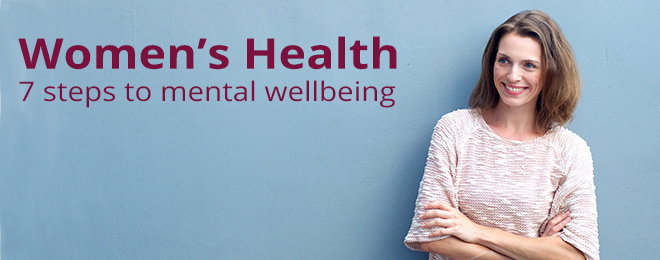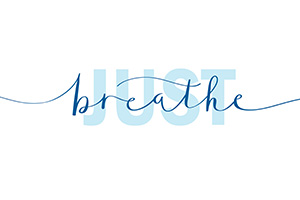
Although times are changing, there is still societal pressure for women to be ‘perfect’, which is only amplified by the ubiquity of social media. We have to be slim, feminine and wrinkle-free, as well as maternal and successful. And these pressures have ushered in a toxic culture of dieting, body dysmorphia, and imposter syndrome, all too often worsening emotional and mental health. Here we hope to provide some of the tools needed to support mental wellbeing, despite social pressures.
Look after your mind
In 2014, one in five UK women reported experiencing a mental health issue.[1] There are many possible explanations for this. Aside from the hormonal fluctuations that often give rise to emotional health challenges, many women tend to be ‘Human Givers’. Scores of working mothers still do the ‘second unpaid shift’, for instance, running a household, raising a family, caring for elderly parents, alongside holding down a job. Being this type of ‘Human Giver’ creates the perfect storm for stress, anxiety, and burnout.
1. The pressure to be perfect
The overwhelming pressure to be ‘perfect’ – appearance-wise, work-wise, family-wise – seems to burden women more. And the omnipresence of social media only perpetuates pressures to be perfect. Remind yourself that you don’t need to strive for perfection; being good enough is always enough.
2. Self-care isn’t selfish
Self-care isn’t selfish. Self-care makes you a better parent, friend and employee. (You need to put your own oxygen mask on first, right?) Dedicate at least fifteen minutes (or more, ideally) to do something unapologetically for yourself each day. Make it a non-negotiable part of your routine. Communicate this need to your family, partner and anyone else who relies on you. Choose an activity that makes you happy and helps you find some stillness amidst the chaos.
- Listen to a podcast
- Potter in the garden
- Buy yourself a barista coffee from your favourite café
- Get a massage
- Have a bath
- Read


3. Complete the stress cycle
Stress is an experience that happens in your body. It’s a physiological cycle that has a beginning, middle and end. You can complete the stress response cycle without even fixing the ‘stressor’. This means you don’t have to fold all the laundry or finish all the dishes to feel calm. All you need to do is signal to your body that you’re safe. Here are some of the best ways to complete the stress response cycle:
- Move (even short-bursts of activity will help)
- Breathe deeply and mindfully
- Seek positive social interaction
- A 20-second hug with someone you trust
- Express yourself creatively
- Sleep
- Laugh
- Cry
4. Nutritional support - Eat more plants
The gut is often referred to as the ‘second brain’. The term ‘gut feeling’ says it all. Feeding your gut, therefore, means feeding your brain. And your gut has an insatiable appetite for plants. We should all be aiming to eat 30 different plant foods a week to support our gut health – and, by proxy, our emotional health. This doesn’t just mean cramming in fruit and veggies. This number includes all plant foods: legumes, grains, nuts, seeds, spices and herbs.
The Smiles Trial (2017)
In The Smiles Trial, researchers randomly assigned participants with low moods to nutritional support or social support for 12 weeks.[1] Those in the nutritional support group were put on a mainly plant-based diet – foods known to nourish the gut – while the other group received social support in the form of therapy. The results were mind-blowing (and not just figuratively): more than 30 per cent of those in the nutritional support group entered full remission (their mood improved), compared to 8 per cent of those in the social support group.
Our top supplements to support mental wellbeing.

5. Care for your cognition
Of course, your cognitive health demands just as much attention as your emotional health. Your brain is a wonder: it stores memories, finds creative solutions to problems and coordinates movements. We owe a great deal to it. But so many of us take its impressive powers for granted. To keep your grey matter sharp, it needs plenty of sleep, social interaction and physical activity.
6. Prioritise sleep
Ever noticed how foggy you feel after a broken night’s sleep? It’s not surprising. Sleep is the best (free!) performance-enhancing drug we have. And yet, many people still believe our mind simply rests and lies dormant when we sleep. Adequate sleep unlocks benefits linked to thinking, memory, and attention. Mother Nature took 3.6 million years to put the necessity of a 7–9-hour sleep period in place. To think we can get away with less than this is hubris.
7. Build social networks
Jonathon Haidt describes humans as 90% chimp, 10% bee.[4] We’re partially an ultra social hive species; we need the connection of other people to survive. Research suggests having close friend and familial ties, as well as engaging in meaningful social activities, may help prevent cognitive decline later in life.[5]
- Join a class, club, or social group
- Nurture relationships in your life
- Befriend neighbours and the people in your community
- Smile and engage with strangers
Find your ‘moai’ friends
‘Moai’ friends are the preserve of the Okinawan people in Japan. Okinawa is a Blue Zone, a longevity hotspot that has an unusually high number of centenarians. A moai is a group of five life-long friends that provide varying social, financial, health and spiritual support.[6] Some moais have lasted upwards of 90 years! Social connectedness is said to be one of the strongest predictors of longevity and happiness. Finding your tribe – or moai – may help protect your brain from stress and chronic diseases. It can add years to your life.
References:
[1] Jacka, F.N., O’Neil, A., Opie, R. et al. (2017) A randomised controlled trial of dietary improvement for adults with major depression (the ‘SMILES’ trial). BMC Med 15, 23.
[2] Remes, O., Brayne, C., van der Linde, R., & Lafortune, L. (2016). A systematic review of reviews on the prevalence of anxiety disorders in adult populations. Brain And Behavior, 6(7), e00497.
[3] Dawson, D., & Reid, K. (1997). Fatigue, alcohol and performance impairment. Nature, 388(6639), 235.
[4] The Hive Hypothesis. (2021) https://www.psychologytoday.com/gb/blog/hidden-motives/201210/the-hive-hypothesis
[5] Age UK (2021). from https://www.ageuk.org.uk/information-advice/health-wellbeing/mind-body/staying-sharp/looking-after-your-thinking-skills/social-connections-and-the-brain/
[6] Kotifani, A. (2021). Moai—This Tradition is Why Okinawan People Live Longer, Better - Blue Zones. from https://www.bluezones.com/2018/08/moai-this-tradition-is-why-okinawan-people-live-longer-better/
